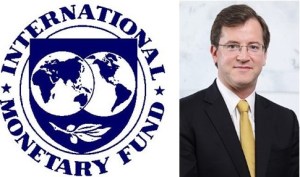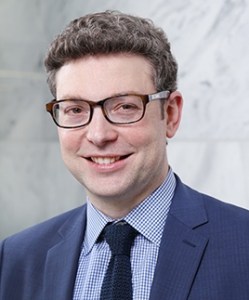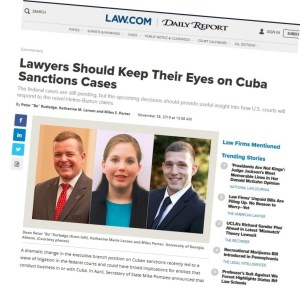This year’s annual conference of the Georgia Journal of International and Comparative Law will consider a highly topical question: “The Law of Global Economic Statecraft.” Featured will be a keynote discussion by Cornell University historian Nicholas Mulder, author of The Economic Weapon: The Rise of Sanctions as a Tool of Modern War (Yale University Press 2022), as well as panels including more than a dozen experts from around the world.
The daylong conference will take place on Monday, October 24, in the Larry Walker Room of Dean Rusk Hall at the University of Georgia School of Law.
Sponsoring along with GJICL, a 50-year-old student-edited journal, is the law school’s Dean Rusk International Law Center. GJICL Executive Conference Editor, 3L Claire Kimbrell, and Senior Conference Editor, Sarah Grace McCord, worked closely with Catrina Martin, the Center’s Global Practice Preparation Assistant, and with GJICL’s Faculty Advisor, Professor Harlan Grant Cohen, who is Gabriel M. Wilner/UGA Foundation Professor in International Law and one of the Center’s Faculty Co-Directors.
The University of Georgia Willson Center for Humanities & Arts is a cosponsor of the keynote event. Additional conference cosponsors include these University of Georgia units: Georgia Law students’ International Law Society; the Center for International Trade & Security, School of Public & International Affairs; the Department of History, Franklin College of Arts & Sciences; and the Department of Economics, Terry College of Business.
Registration for all aspects of the conference (to be livestreamed for online registrants) here.
Here’s the concept note:
“The global economy has been weaponized. It’s not clear when it happened, or whether it’s even something new, but watching the response to Russia’s invasion of Ukraine has made it impossible to ignore. With breathtaking speed, a full phalanx of sophisticated economic tools was mobilized against Russia that threatened to sever it from the global economy. For its, part, Russia demonstrated the continued force of its own economic weapons – its control over substantial supplies of oil and gas. But the speed with which these tools were amassed was in fact testament to years of experiments and practice. Economic tools that had been developed to isolate “rogue states,” to fight terrorist networks, and to punish human rights abusers had begun to show how the carrot of the global market could quickly become a lever of influence and a forceful stick. But these tools gained new prominence as they were refined and redeployed for use in the intensifying economic and geopolitical rivalry between China, the United States, and Europe.
“Is international law prepared for this reality? Until recently, tools of economic pressure have been left largely to the margins of the discipline, treated at best as the preferred alternative to more regulated fields of military activities, at worst as exceptional tools that could largely be ignored – even in the face of critiques from the Global South and regarding human rights. While every international law textbook has chapters on the regulation of military activity and economic cooperation, few have standalone sections on sanctions. International economic law regimes meanwhile struggle to adapt to the realities of ‘geoeconomics’ and ‘weaponized interdependence,’ in which, structures designed to encourage economic cooperation are repurposed as tools of competition and rivalry.
“A reconsideration is long overdue. This symposium surveys the current state of economic statecraft – the tools in use, their purposes, and their targets. It explores how they are or should be regulated. But most importantly, it seeks to put today’s economic statecraft in historical, political, and legal context asking critical questions about the international order they reflect and the international order they might require.”
The day’s events are as follows:
9-9:10 am Welcome
- Melissa J. “MJ” Durkee, Associate Dean for International Programs, Director of the Dean Rusk International Law Center, and Allen Post Professor, University of Georgia School of Law
9:10-10:30 am How We Got Here
Speaking on this 1st panel:
- Zohra Ahmed, Assistant Professor of Law, University of Georgia School of Law
- Mona Ali, Associate Professor of Economics, State University of New York-New Paltz
- Henrique Choer Moraes, Minister-Counsellor, Embassy of Brazil in New Zealand
- Nicholas Mulder, Assistant Professor and Milstein Faculty Fellow, Cornell University Department of History
10:45 am-12:05 pm Where We Are
Lauren Brown, Associate, Squire Patton Boggs, Washington, D.C., will moderate this 2d panel. Speaking will be:
- Sarah Bauerle Danzman, Director, Tobias Center for Innovation in International Development, and Associate Professor, International Studies, Indiana University-Bloomington
- Maryam Jamshidi, Associate Professor of Law University of Florida Levin College of Law
- Tom Ruys, Professor, Faculty of Law and Criminology, Department of European, Public, and International Law, Ghent University, Belgium
- Jan Zahradil, Member, European Parliament
1:05-2:25 pm Where We’re Headed
Speakers on this 3d panel:
- Elena Chachko, Lecturer on Law, Harvard Law School
- J. Benton Heath, Assistant Professor of Law, Temple University Beasley School of Law
- Henry Farrell, SNF Agora Institute Professor of International Affairs at SAIS, Johns Hopkins University
- Mona Paulsen, Assistant Professor of Law, London School of Economics Law School, England
2:40-3:55 pm Keynote Book Discussion on “The Economic Weapon: The Rise of Sanctions as a Tool of Modern War”
3:55 pm Thank You
- Courtney Robinson, Editor-in-Chief, Georgia Journal of International and Comparative Law








 Professor
Professor 
 Recent change in US policy toward Cuba is the subject of a new commentary by the dean and 2 student researchers here at the University of Georgia School of Law.
Recent change in US policy toward Cuba is the subject of a new commentary by the dean and 2 student researchers here at the University of Georgia School of Law.